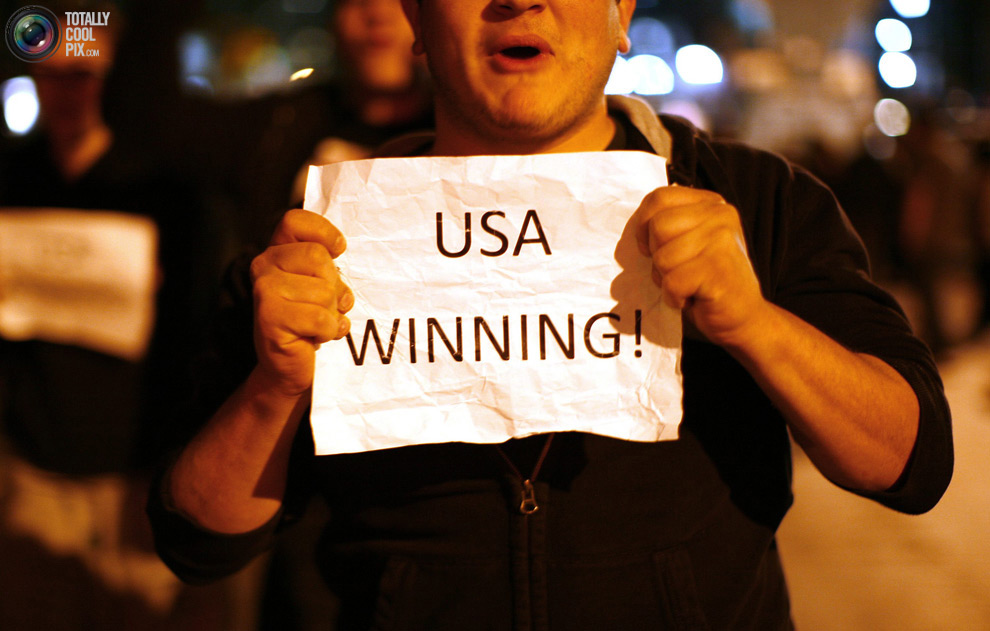Let me begin by making it clear that I did not lose a wink of sleep on Sunday evening after learning of the death of Osama bin Laden. On the other hand, I have been deeply troubled by the numerous slide shows (e.g., here, here, and here) that have emphasized the celebration of the assassination of America’s number one “public enemy” as a matter of national pride on par with winning an Olympic sporting event (replete in television reports with video representations of ritualistic chants of “USA, USA”). The Agon has done a pretty good job of calling out the problematic relationship between nationalism and sport as it relates to this particular event—not least the absurdity of most of those doing the celebrating as if they were the Navy Seals who actually did the job, rather like fans who claim membership in “Yankee Nation” or “Red Sox Nation” and then take the credit for their team’s good fortunes as if they actually played the game themselves. And others have made the point that there is something problematic in celebrating the death of any individual, for as the poet put it, “every man’s death diminishes me.” Both points are well taken, and yet there is still a different point to be made.
The photograph above moderates the announcement of victory so boldy asserted in most of the celebratory photographs by casting it in the present continuous tense: the USA is “winning.” The ambiguity here is pronounced, for while it could be taken to mean that victory is all but inevitable, notice too that it also implies that the contest is not yet over. That should give us pause, for as the philosopher Yogi Berra put, “it ain’t over till its over.” But even that begs the much bigger question: what has been won or what do we stand to win?
For some, no doubt, Osama bin Laden has been brought to justice. And that is no small thing. But what exactly does it mean to count that as a marker of “winning”? In the nearly ten years since 9/11 we have sacrificed numerous civil liberties, both for ourselves and for others. Citizens can no longer board an airplane without the risk of being “patted down” by TSA officials as if they were common criminals, and that is perhaps the least of the inconveniences we now experience as a matter of course when we travel. Our leaders have endorsed the use of “enhanced interrogation techniques” as a way of skirting the Geneva Conventions, and with it we have sacrificed a part of our humanity. We have initiated two wars of occupation that have not only cost us the lives of nearly six thousand American troops, but countless others as well. The financial cost (1.2 trillion dollars and counting) of these wars is primarily (if not singularly) responsible for the debt burden that our government now carries and will be passed on to future generations. And there is no real end in sight, the death of Osama bin Laden to the contrary notwithstanding. One can make an argument to justify each and everyone of these responses to attacks made against our nation, but in the end it is hard to imagine the result as anything but a Pyrrhic victory, let alone as a moment for haughty celebration.
Yes, Osama bin Laden is dead. Justice has been served. But one really has to wonder who the real winner is.
Photo Credit: Eric Thayer/Reuters.
Cross-posted at BAGnewsNotes.

IMO, history will look back at this particular moment as the point where the (so-called) Unites States of America began its slide into oblivion to join the rest of the once-upon-a-time Super Powers. Or, in more poetic terms, when Yang in the extreme became Yin.
All this is all the more troubling and eery in light of the name of the mission to kill bin Laden: “Operation Geronimo.” I’m not sure what it is that we “win.”
There is too much going on in these photographs that are problematic to me. The prevalence of college-aged students who found the best excuse this week to continue their daily rituals of binge drinking; the haunting parallels between the expressions of elation between al Queda forces attacking America and America’s assassination of Bin Laden; et cetera. Broader rhetorics are also troubling, especially those that seek to justify dubious activities (as you said) on the grounds that it brought Bin Laden to justice.
My thoughts on the “celebrations” in their immediacy was how angry and galvanized American responses were when assumptively Middle-Eastern celebrations were televised after 9/11 and at other points in the past 10 years. It was the images that magnified US anger and the concurrent ratcheting up of nationalistic fervor.
I wonder too about the affective role that these demonstrations play. Clearly there is joy–but it is epidiectic joy; there is no policy that emanates from these public displays. There have been a few calls for immediate withdrawal from Afghanistan and Iraq, but nobody really expects this. It may also be that the death of bin laden is cathartic for some; but again to what end? Is there a new perspective that comes with this catharsis? I don’t see one.
Also, the Charlie Sheen “winning” meme that has infiltrated the public vocabulary in the last month or so also seems to collapse the reality of death–in all of the manifestations that JLL points out above–with celebrity scandal and pop-culture inanities. The recourse to nationalism is thus not just reductionism to bumper sticker politics, it also trivializes those deaths and the seizure of civil liberties (John, I disagree with you a bit that these liberties were “sacrificed” I don’t think the public had the agency required for a sacrifice).
Good point, David, though when I said “we have sacrificed” I was trying to use the “royal” we. Nevertheless, Congress did pass the Patriot Act …